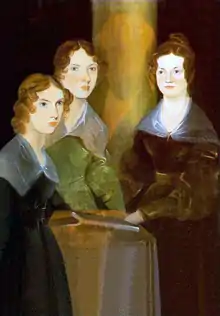Maria Brontë
Maria Brontë (/ˈbrɒnti/, commonly /ˈbrɒnteɪ/;[1] 23 April 1814[2] – 6 May 1825)[3] was the eldest daughter of Patrick Brontë and Maria Brontë, née Maria Branwell.
She was the elder sister of Elizabeth, Charlotte, Branwell, Emily, and Anne. She was born in Hartshead, Yorkshire,[4] and died at the age of 11.
Early life and education
When Maria was six years old, she was characterised as "grave, thoughtful, and quiet, to a degree far beyond her years".[5] Soon after their mother's death in 1821, Maria and her sisters grew up largely with the company of one another, preferring to stay away from society. Maria often read the many newspapers bought into the household by their father and revealed her findings to her sisters.[5]
Maria was said to have been a precocious child. According to her father, when he asked 10-year-old Maria "what...the best mode of spending time [was]", she answered, "By laying it out in preparation for a happy eternity."[6][7] He later said that he could speak with Maria on any popular topic of the day as fluently as with an adult,[7] and regretfully recalled her "powerfully intellectual mind".[8] A printer from Thornton also remembered Maria correcting the proofs of one of Mr. Brontë's long poems. According to Charlotte, she was rather serious and silent than otherwise, and Mrs. Gaskell described her as "delicate, unusually clever and thoughtful for her age, gentle, and untidy".[7]
On 1 July 1824, Maria, 10, and Elizabeth, joined the Cowan Bridge School with Charlotte and Emily following soon after in September.[5] The food provided by the school was generally poorly cooked and unhealthy, and the cook was reported to be "careless, dirty, and wasteful".[5] Both Maria and Elizabeth had just recovered from measles and whooping cough, and despite hunger, they often did not eat.[5] The school register read:[9]
Maria Brontë, aged 10 ... reads tolerably. Writes pretty well. Ciphers a little. Works badly. Very little of geography or history. Has made some progress in reading French, but knows nothing of the language grammatically.
Miss Andrews, a teacher there, admitted that Maria had a "fine imagination and extra-ordinary talents".[10]
Death
In spring 1825, a typhoid epidemic swept through the school, causing the departure of almost a sixth of the students between February and June.[11] By the winter of 1824, Maria's health was already deteriorating due to tuberculosis. On 14 February 1825, Maria was withdrawn from the school.[3] She lived at Haworth for three months, alongside her brother Branwell and her youngest sister, Anne – who were the only siblings left at the parsonage – before dying at the age of 11.[3][5]
Patrick attributed Maria's death to a divine aspect: "She exhibited during her illness many symptoms of a heart under Divine influence. Died of decline".[12]
Influence
According to Elizabeth Gaskell, Maria inspired the pious character Helen Burns in Jane Eyre,[3][7][10] and a teacher on whom Miss Scatcherd was modelled subjected Charlotte's "gentle patient dying sister [Maria]" to "worrying and cruelty".[3][7]
References
- As given by Merriam-Webster Encyclopedia of Literature (Merriam-Webster, incorporated, Publishers: Springfield, Massachusetts, 1995), p viii: "When our research shows that an author's pronunciation of his or her name differs from common usage, the author's pronunciation is listed first, and the descriptor commonly precedes the more familiar pronunciation." See also entries on Anne, Charlotte and Emily Brontë, pp 175–176.
- Patricia Ingham (2006): The Brontës (Oxford University Press), p. xii.
- Fraser, Rebecca (2008). Charlotte Brontë: A Writer's Life (2 ed.). New York: Pegasus Books LLC. p. 261. ISBN 978-1-933648-88-0.
- Chitham, Edward (1993). A Life of Anne Bronte. Oxford: Wiley-Blackwell. ISBN 0-631-18944-0.
- Brontë, Charlotte (1876). Life and works of Charlotte Brontë and her sisters. 7. Smith, Elder & Co. Plaintext
- Patrick Brontë to Elizabeth Gaskell, 1855, Brontë Society Transactions 8:44:127
- Gaskell, Elizabeth (2009). The Life of Charlotte Brontë. Digireads.com. ISBN 978-1-4209-3231-7.
- Patrick Brontë to Elizabeth Gaskell, 20 June 1855
- Shakespeare Head I, Lives and Letters, p. 69
- "Bronte Parsonage Museum – Maria Brontë". bronte.org.uk. Retrieved 26 September 2010.
- Edward Chitham, A Life of Emily Brontë, Basil Blackwell, 1987, p. 46
- The Journal of Education, Volume 22. W. Stewart & Co. 1900.
